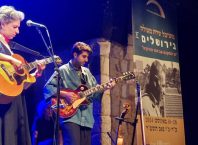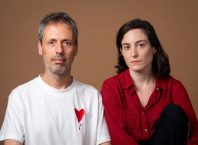From Lovetaps, by Carl Hoffman. iUniverse, 2003
He, not a day less than 90 years old, sits quietly in his wheel-chair, his pale bald head covered with what must be the last Panama hat in all of Israel. She, probably not a day more than 30, sits next to him at the edge of a bench, gently patting his arm and nodding her head occasionally when he speaks. His lined face and bright gray eyes sparkle with recollections of youthful years in a small town on the marshy banks of a tea-colored river called the Pripyat. Her dark brown eyes smile with visions of verdant sun-dappled mountains tumbling downward toward white-sand beaches and a shimmering blue tropical sea. He, born long ago in Poland, likes to sit in this same spot every day, watching the life of this bustling Israeli city pulse and parade colorfully by him. She, his Filipina metapelet, wheels him here every afternoon, sits softly by his side and dreams her dreams of home.
His speech is a cholent of Hebrew and English, heavily seasoned with Yiddish. Her “English” it turns out, is mostly Tagalog, resonating with the lilting, musical cadences of southern Luzon. And yet at some level, beyond language or perhaps somewhere deep beneath it, they seem to understand each other perfectly.
He tells her about long-ago weddings and radiant Sabbaths, of Purimspiels and Passover seders—a thousand shtetl simchas from decades ago. She tells him about joyful town fiestas, colorful processions of saints, Flores de Mayo parades and pious Noche Buena feasts. Hour after hour, day after day; they have learned to find familiar landmarks in their visits to each other’s pasts.
So, away she went, to a far-away, strife-torn country she knew only as the “Holy Land,” to take care of a lonely old Jewish man.
They arrive at their usual spot this day as everyday—a bone-thin, frail old man and a short, almost boyish-looking young woman, each happy to escape the confines of a dark cluttered flat at the end of a row of three-story white apartment buildings on a somber Herzliya street. She glances at her watch and reaches for a small plastic bottle of mineral water from a basket by her feet. “Saba,” she says in her child-like voice, “it’s time to take your medicine,” as she hands him the bottle and four little pills of different shapes and colors. He rouses himself from a daydream, swallows the pills slowly, one by one. She moves to adjust his jacket collar; he stops her with a languid wave of his hand. They settle in and get comfortable, ready for the hours to roll by.
Once, there was a family. He had a wife—happily married for 48 years—and two daughters who grew up joyously smothering him with their love. The years marched happily on. But the wife died almost ten years ago after a lingering illness, and the daughters have long since married and moved away—both overseas, far away.
Once, there was a family. She had her parents, and five older brothers. They all stood with her, bright-eyed and smiling, on that golden day seven years ago as she, proudly bedecked in her crimson cap and gown, received her diploma and a bachelor’s degree in education from a poor but prestigious teachers’ college in Manila. It was not long after that, however, that those same smiling parents and five under-employed older brothers informed her that their continued survival required more money than she could provide with her meager teacher’s salary. So, away she went, to a far-away, strife-torn country she knew only as the “Holy Land,” to take care of a lonely old Jewish man.
Late morning slides into early afternoon. The sun becomes strong, and she rises from her perch at the edge of the bench to move his wheelchair slightly backward, into a bit of shade. He raises his hand in faint protest, but she gently moves him anyway, reminding him of the dangers of too much sun. He sighs and says he is hungry, so she reaches into the basket for the cheese sandwiches she made before leaving the old man’s apartment. As they begin to eat, a No. 29 Egged bus slows down as it approaches them, the driver beeping his horn inquiringly. She waves the bus away; they are not going anywhere.
This afternoon, it seems, is a time for talk. His face darkens as his mind wanders inexorably back to a nightmare time and place. He tells her again, in words she does not understand but with emotion she can feel as intensely as he, of brutal violence and unspeakable horror—of shouting German soldiers and snarling dogs, of frightened women and silent men; of hiding in the cellar of a Polish family’s house while parents and neighbors, brothers and sisters, cousins and friends, Rabbis and teachers, classmates and playmates are herded toward the edge of town, never to return, never to be seen again.
She tells him again, in words he does not understand but with emotion he can feel as intensely as she, some of the stories she grew up with—of a terrifying defeat and crushing surrender, of shouting Japanese soldiers and razor-sharp bayonets; of a grandfather, father and uncles herded down the sun-scorched, dusty roads of Bataan alongside the captured American troops, prodded and beaten for days without food or water, and dumped into a squalid prison camp to begin more than two years of starvation and torment.
Shadows lengthen as the afternoon wanes. They sit together, now in silence, their thoughts far away. The sun slowly departs, leaving a chill in the air—a chill felt acutely by a frail old man nearing the end of his days, and a care-giving young lady from a distant land of endless summer.
She rises from the bench and gathers their things. He returns to the present and angles his head forward expectantly as she unlocks the wheelchair and gently turns it in the direction of home. They amble forward together slowly, this day as every day, toward a dark cluttered flat at the end of a row of three-story white apartment buildings on a somber Herzliya street.





